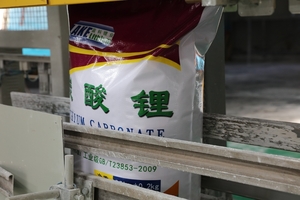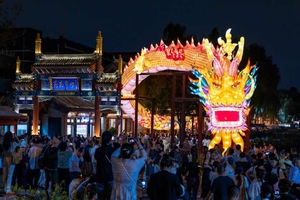Prolonged Price Slide Punishes China’s Lithium Hub
Listen to the full version
Yichun is known by some as the “lithium capital of Asia” — a moniker to wave proudly just two years ago. But the wind has been taken out of the Jiangxi province city’s sails somewhat as a supply glut of the key electric-vehicle (EV) battery material sent prices tumbling, hitting Yichun and its core industry hard.
Many processors and producers in the lithium hub have had to curb production or shut down entirely to stem losses. This marks a stark contrast to 2022, when the industry boomed, fueled by growing demand for state-subsidized EVs that drove lithium prices soaring.

Download our app to receive breaking news alerts and read the news on the go.
Get our weekly free Must-Read newsletter.
- DIGEST HUB
- Yichun, dubbed the "lithium capital of Asia," faces a crisis as lithium carbonate prices plummet from 590,000 yuan (Nov 2022) to 74,000 yuan per ton.
- This market downturn has led to reduced or ceased production among many lithium processors, severely impacting Yichun's lithium industry.
- Although some companies struggle, those with mining resources or larger operations like CATL are better positioned, anticipating long-term market recovery.
Yichun, dubbed “the lithium capital of Asia,” has faced a significant downturn due to a supply glut of lithium carbonate, a crucial material for electric vehicle (EV) batteries. This glut has led to a drastic drop in prices, severely impacting Yichun's lithium industry. [para. 1] [para. 3]
In recent times, many processors and producers in Yichun's lithium sector have had to reduce or shut down production to mitigate losses. This scenario starkly contrasts with the boom of 2022, when increasing demand for state-subsidized EVs led to skyrocketing lithium prices. [para. 2] The oversupply of lithium carbonate production soon surpassed EV demand, causing prices to plummet. [para. 3]
The spot price of lithium carbonate has experienced a dramatic fall, dropping from a high of 590,000 yuan per ton in November 2022 to just 74,000 yuan per ton as of a recent Tuesday, according to OilChem China data. [para. 4]
Lü Jun, director of Yichun’s lithium battery new-energy industry development center, stated that companies face tough decisions when lithium prices drop to 90,000 yuan per ton, forcing many to reduce or halt production. [para. 5] A business source indicated that many companies had invested in new plants in 2022, but most of these were shut down by July of this year, some within less than a year's operation. [para. 6]
The city government acknowledged that the crashing lithium prices and production halts have adversely affected Yichun's lithium industry. As of the end of 2022, Yichun held around 5.74 million tons, or 28%, of China's total lithium reserves. Despite this, the industry's total revenue fell by 14.41% year-on-year to 30.6 billion yuan in the first five months of this year, with profits plunging 81.48% to 757 million yuan. [para. 8]
Half of Yichun's lithium producers have slashed output due to plummeting prices and high raw material costs. Up to 40% of the city’s lithium carbonate companies are currently inactive, according to Lü. [para. 9] For companies without their own mining resources, operational activities have nearly come to a halt. Wu Li, general manager of Jiangxi Lingneng Lithium Co. Ltd., confirmed the company ceased production this year after failing to achieve profitability when lithium carbonate futures prices fell below 100,000 yuan per ton. [para. 10]
An adjacent lithium salt producer completed its plant in August 2023 but has not started production due to the severe drop in lithium carbonate prices. [para. 12] However, companies with their own mines are relatively better off. They can maintain production costs between 60,000 and 70,000 yuan per ton, as per Fan Runze, a senior industry analyst at Beijing Antaike Information Co. Ltd. [para. 13]
For instance, a joint venture between Contemporary Amperex Technology Co. Ltd. (CATL) and Jiangsu Lopal Tech Co. Ltd., which owns Yichun’s largest lithium mica mine, remains relatively unaffected and is even ramping up production to meet CATL’s downstream demand and prepare for a future price rebound. [para. 14][para. 15] Xie Yichao, a senior executive of the venture, views the current scenario as a normal market correction after the previous spike in prices and believes that long-term demand for lithium will continue to grow due to the government’s focus on energy transition. [para. 15][para. 16]
Many industry insiders predict that the price slump will persist for another one to two years. Lü forecasts a wave of lithium producers will be forced out of the market by 2025, with a potential market rebound the following year. [para. 17]
- Jiangxi Lingneng Lithium Co. Ltd.
- Jiangxi Lingneng Lithium Co. Ltd. began operations in September 2022 but ceased production this year due to plummeting lithium carbonate prices. The company could not make a profit when prices fell below 100,000 yuan per ton, leading to a halt in their operations.
- Contemporary Amperex Technology Co. Ltd. (CATL)
- Contemporary Amperex Technology Co. Ltd. (CATL) is a joint venture that owns the right to exploit Yichun’s largest lithium mica mine. Despite the lithium price plunge, CATL is still ramping up production to meet its large downstream demand and prepare for a future price rebound. The company believes the industry is going through a normal correction and expects long-term strong demand due to the energy transition focus of the government.
- Jiangsu Lopal Tech Co. Ltd.
- Jiangsu Lopal Tech Co. Ltd. (603906.SH) is part of a joint venture with Contemporary Amperex Technology Co. Ltd. (CATL) to exploit Yichun’s largest lithium mica mine. The venture is currently ramping up production to meet CATL’s downstream demand and prepare for a future rebound in lithium prices. This partnership aims to weather the industry’s price slump relatively well compared to other companies.
- PODCAST
- MOST POPULAR







 Sign in with Google
Sign in with Google
 Sign in with Facebook
Sign in with Facebook
 Sign in with 财新
Sign in with 财新